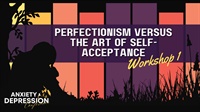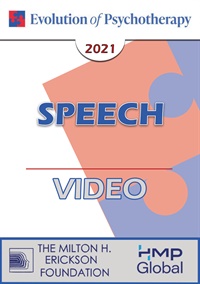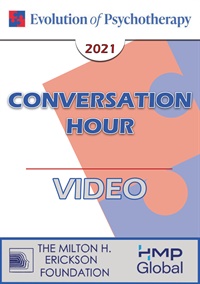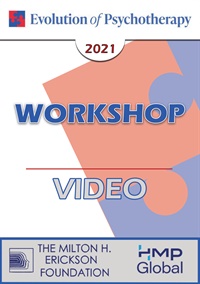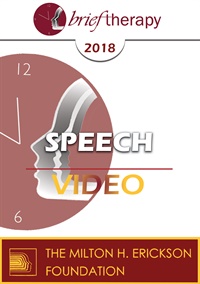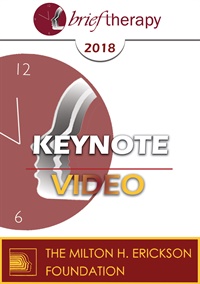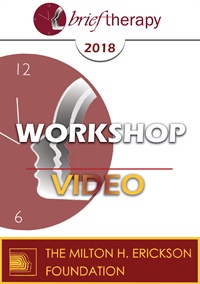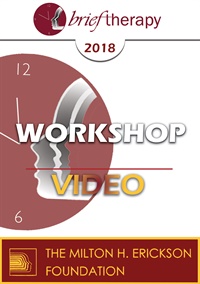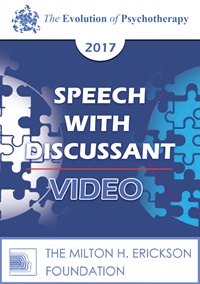- Average Rating:
- Not yet rated
- Topic Areas:
- Workshops | Belief Systems | Cognitive Behavior Therapy (CBT) | Self-Esteem
- Categories:
- Anxiety and Depression Conference 2024
- Faculty:
- David Burns, MD | Jill Levitt, PhD
- Course Levels:
- Master Degree or Higher in Health-Related Field
- Duration:
- 2:03:13
- Format:
- Audio and Video
- Original Program Date:
- Sep 14, 2024
- Short Description:
- People can be undone by the belief that they must never fail. In this interactive workshop, David Burns and Jill Levitt examine how perfectionism and achievement-based self-worth fuel shame, anxiety, and burnout. Using the TEAM CBT framework, they demonstrate practical strategies through case material and live role plays for addressing resistance, challenging the inner critic, and fostering genuine self-acceptance without sacrificing excellence.
- Price:
- $59.00 - Base Price
- Average Rating:
- Not yet rated
- Topic Areas:
- Psychotherapy | Speeches | Neuroscience
- Categories:
- Evolution of Psychotherapy | Evolution of Psychotherapy 2021
- Faculty:
- Daniel Amen, MD
- Course Levels:
- Master Degree or Higher in Health-Related Field
- Duration:
- 1 hour
- Format:
- Audio and Video
- Original Program Date:
- Dec 03, 2021
- Short Description:
- This speech reframes mental illness as a brain health issue, offering a hopeful, science-based path toward healing. Participants learn the “Bright Minds” framework—11 key risk factors that influence brain function and mood—and discover practical ways to strengthen mental wellness through nutrition, sleep, exercise, supplements, and lifestyle change. The session provides a compassionate roadmap for prevention, recovery, and lasting emotional vitality.
- Price:
- $59.00 - Base Price
- Average Rating:
- Not yet rated
- Topic Areas:
- Conversation Hours | Neuroscience
- Categories:
- Evolution of Psychotherapy | Evolution of Psychotherapy 2021
- Faculty:
- Daniel Amen, MD
- Course Levels:
- Master Degree or Higher in Health-Related Field
- Duration:
- 1 hour
- Format:
- Audio and Video
- Original Program Date:
- Dec 02, 2021
- Short Description:
- This conversation hour draws on insights from nearly 200,000 brain scans to reveal how imaging reshapes the understanding of mental health and behavior. Participants learn how factors like trauma, toxins, infection, and lifestyle impact brain function and how personalized, brain-based interventions can restore balance. The session offers a forward-looking view of psychiatry grounded in compassion, prevention, and the principle that healing the brain transforms the mind.
- Price:
- $59.00 - Base Price
- Average Rating:
- Not yet rated
- Topic Areas:
- Workshops | Strategic Therapy | Ericksonian Hypnosis and Therapy Techniques
- Categories:
- Evolution of Psychotherapy | Evolution of Psychotherapy 2021
- Faculty:
- Michael Yapko, PhD
- Course Levels:
- Master Degree or Higher in Health-Related Field
- Duration:
- 2 hours
- Format:
- Audio and Video
- Original Program Date:
- Dec 01, 2021
- Short Description:
- This workshop explores how deliberately general hypnotic language can create precise therapeutic change. Through a process-oriented approach, participants learn to use suggestion, focus, and responsiveness to evoke self-generated insights. Emphasis is placed on how broad phrasing, observation, and strategic pacing foster flexibility, depth, and individualized outcomes.
- Price:
- $59.00 - Base Price
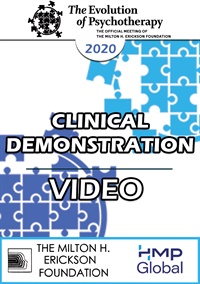
EP20 Clinical Demonstration 11 - Learn to Read Brain Scans: 50 Scans in 60 Minutes - Daniel Amen, MD
- Average Rating:
- Not yet rated
- Topic Areas:
- Neuroscience | Clinical Demonstrations | Psychotherapy
- Categories:
- Evolution of Psychotherapy | Evolution of Psychotherapy 2020
- Faculty:
- Daniel Amen, MD
- Course Levels:
- Master Degree or Higher in Health-Related Field
- Duration:
- 1 hour
- Format:
- Audio and Video
- Original Program Date:
- Dec 13, 2020
- Short Description:
- This engaging session offers a fast-paced tour through fifty brain scans that reveal how imaging transforms mental health practice. Participants learn to recognize patterns linked to trauma, addiction, mood disorders, and toxicity, and discover how SPECT imaging helps differentiate biological from psychological causes. The session provides practical insight into using brain-based evidence to guide treatment, reduce stigma, and inspire hope for healing.
- Price:
-
Sale is $29.00
price reduced from Base Price - $59.00
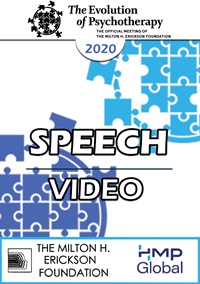
- Average Rating:
- Not yet rated
- Topic Areas:
- Neuroscience | Speeches | Personality Disorders
- Categories:
- Evolution of Psychotherapy | Evolution of Psychotherapy 2020
- Faculty:
- Daniel Amen, MD
- Course Levels:
- Master Degree or Higher in Health-Related Field
- Duration:
- 1 hour 20 minutes
- Format:
- Audio and Video
- Original Program Date:
- Dec 12, 2020
- Short Description:
- This keynote reframes mental illness as a matter of brain health rather than personal weakness or psychological failure. Participants learn how lifestyle, trauma, toxins, and biological factors affect the brain, and how targeted interventions can restore balance. The session introduces practical tools from the “Bright Minds” framework to prevent and reverse cognitive and emotional decline, offering a hopeful new vision for healing the brain and transforming mental health.
- Price:
-
Sale is $29.00
price reduced from Base Price - $59.00
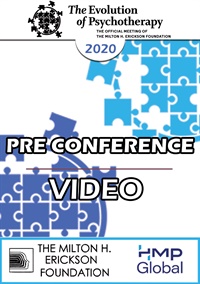
- Average Rating:
- Not yet rated
- Topic Areas:
- Neuroscience | Pre-Conference Sessions | Psychotherapy
- Categories:
- Evolution of Psychotherapy 2020 | Evolution of Psychotherapy
- Faculty:
- Daniel Amen, MD
- Course Levels:
- Master Degree or Higher in Health-Related Field
- Duration:
- 6 hours
- Format:
- Audio and Video
- Original Program Date:
- Dec 08, 2020
- Short Description:
- This pre-conference workshop invites psychotherapists into the world of applied neuroscience, showing how brain imaging transforms clinical insight. Participants learn to identify the biological underpinnings of behavior, mood, and cognition through practical models linking brain systems to psychological function. The session offers brain-based tools to enhance therapy, prevent misdiagnosis, and promote healing through nutrition, lifestyle, and targeted interventions that improve both brain and mind.
- Price:
-
Sale is $49.00
price reduced from Base Price - $99.00
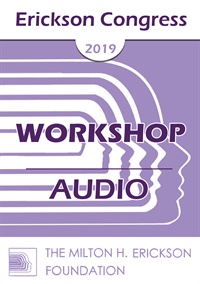
- Average Rating:
- Not yet rated
- Topic Areas:
- Workshops | Post-Traumatic Stress Disorder (PTSD) | Trauma
- Categories:
- Erickson Congress | Erickson Congress 2019
- Faculty:
- John Beahrs, MD | Bill O'Hanlon, MS | Michael Yapko, PhD | Jeffrey Zeig, PhD
- Duration:
- 1 Hour 57 Minutes
- Format:
- Audio Only
- Original Program Date:
- Dec 13, 2019
- Short Description:
- This symposium examines how trauma treatment can unintentionally amplify distress and how therapists can instead foster resilience and agency. Presenters explore the dynamics of reenactment, victim identity, and iatrogenic harm, offering strategies to prevent retraumatization and promote post-traumatic growth. Through clinical examples and cultural analysis, the panel emphasizes critical thinking, self-regulation, and the use of hypnosis, mindfulness, and narrative reframing to restore meaning and self-efficacy after trauma.
- Price:
- $15.00 - Base Price
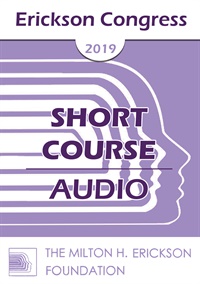
- Average Rating:
- Not yet rated
- Topic Areas:
- Short Courses | Anxiety | Depression | Ericksonian Hypnosis and Therapy Techniques | Children and Adolescent Therapy | Eye Movement Desensitization and Reprocessing (EMDR) | Hypnosis | Cognitive Behavior Therapy (CBT)
- Categories:
- Erickson Congress | Erickson Congress 2019
- Faculty:
- Joseph Sestito, MSSA, LISW-S
- Duration:
- 1 Hour 33 Minutes
- Format:
- Audio Only
- Original Program Date:
- Dec 12, 2019
- Short Description:
- The first factor that is of central importance is developing a strong therapeutic alliance with the client, mainly through empathically relating to him/her. Second, it will be shown how to guide adolescents and younger children to identify the specific Activating Event (AE) that is bringing about their unhealthy negative emotions through triggering self-defeating cognition(s).
- Price:
- $15.00 - Base Price
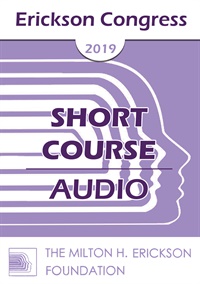
- Average Rating:
- Not yet rated
- Topic Areas:
- Short Courses | Anxiety | Communication | Depression | Neurobiology
- Categories:
- Erickson Congress | Erickson Congress 2019
- Faculty:
- Bart Walsh, MSW
- Duration:
- 1 Hour 29 Minutes
- Format:
- Audio Only
- Original Program Date:
- Dec 12, 2019
- Short Description:
- Chronic anxiety and depression present significant challenges for those affected by these conditions. A behavioral treatment which accesses deep levels of mind-body functioning facilitates remission of these debilitating conditions. This treatment, conceptualized as essential neurobiological communication (ENBC), incorporates a form of body language known as ideomotor signaling.
- Price:
- $15.00 - Base Price
Tags: Anxiety Depression Neurobiology
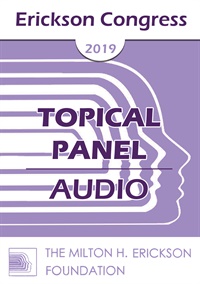
- Average Rating:
- Not yet rated
- Topic Areas:
- Workshops | Dialectic Behavior Therapy (DBT) | Interviewing | Motivation | Cancer | Depression | Resistance
- Categories:
- Erickson Congress | Erickson Congress 2019
- Faculty:
- Neil Fiore, PhD
- Duration:
- 1 Hour 54 Minutes
- Format:
- Audio Only
- Original Program Date:
- Dec 12, 2019
- Short Description:
- Training cancer patients in Stress Management and Dialectic Behavior Therapy methods to challenge worries, ineffective self-management, and ambivalence, using Motivational Interviewing:
- Price:
- $15.00 - Base Price
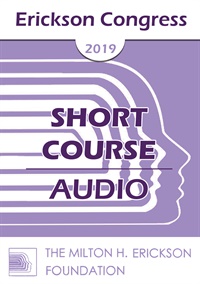
- Average Rating:
- Not yet rated
- Topic Areas:
- Short Courses | Depression | Trauma | Seeding | Therapeutic Relationship
- Categories:
- Erickson Congress | Erickson Congress 2019
- Faculty:
- Robert Wubbolding, EdD
- Duration:
- 1 Hour 24 Minutes
- Format:
- Audio Only
- Original Program Date:
- Dec 12, 2019
- Short Description:
- The American novelist William Faulkner stated, "The Past is never dead. In fact, it is not even past." This presentation emphasizes the unconventional use of reality therapy that connects the past with the presents by helping clients realize that their current behaviors are normal responses to abnormal situations that they have experienced. It also operationalizes the Ericksonian principle: "The solution often appears unrelated to the problem."
- Price:
- $15.00 - Base Price
Credit available - Click Here for more information
- Average Rating:
- Not yet rated
- Topic Areas:
- Speeches | Children and Adolescent Therapy | Art and Creativity | Brief Therapy | Family Therapy | Anxiety | Depression | Goals of the Therapist
- Categories:
- Brief Therapy Conference | Brief Therapy Conference 2018 | Online Continuing Education
- Faculty:
- Lynn Lyons, LICSW
- Course Levels:
- Master Degree or Higher in Health-Related Field
- Duration:
- 1:02:45
- Format:
- Audio and Video
- Original Program Date:
- Dec 09, 2018
- Short Description:
- We don't often think of creativity and problem solving as equal partners in therapy with children. But when struggling families arrive at your office, it is the immediate blending of these two components that allows you and the family to move quickly from overwhelmed to engaged, confused to targeted. Based on 29 years of successes and failures, this speech will offer ideas to immediately connect with families, help them untangle the tired messiness they often arrive with, and create active interventions that build momentum, create new patterns, and offer hope.
- Price:
-
Sale is $29.00
price reduced from Base Price - $59.00
Credit available - Click Here for more information
- Average Rating:
- Not yet rated
- Topic Areas:
- Keynotes | Anxiety | Brief Therapy | Cognitive Behavior Therapy (CBT) | Depression
- Categories:
- Brief Therapy Conference | Brief Therapy Conference 2018 | Online Continuing Education
- Faculty:
- David Burns, MD
- Course Levels:
- Master Degree or Higher in Health-Related Field
- Duration:
- 1:00:36
- Format:
- Audio and Video
- Original Program Date:
- Dec 09, 2018
- Short Description:
- Dr. Burns will describe powerful new TEAM-CBT techniques that can greatly accelerate recovery from depression and anxiety disorders. He will bring these tools with life with dramatic video excerpts from a therapy session with a mental health professional who had been struggling with years of intense anxiety, depression, and guilt.
- Price:
-
Sale is $29.00
price reduced from Base Price - $59.00
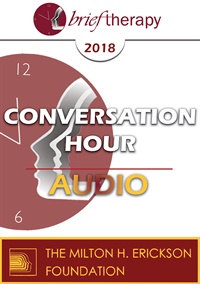
- Average Rating:
- Not yet rated
- Topic Areas:
- Great Conversations | Depression
- Categories:
- Brief Therapy Conference | Brief Therapy Conference 2018 | Pioneers in Couples and Family Therapy
- Faculty:
- Judith Beck, PhD | Michele Weiner-Davis, LCSW
- Duration:
- 59:10
- Format:
- Audio Only
- Original Program Date:
- Dec 08, 2018
- Short Description:
- This conversation explores CBT-informed approaches to depression, emphasizing behavioral activation, therapeutic alliance, and clinical flexibility. Beck and Weiner-Davis discuss how hope, core beliefs, and relational support shape recovery, while also addressing medication, family inclusion, and the value of comprehensive evaluation.
- Price:
- $15.00 - Base Price
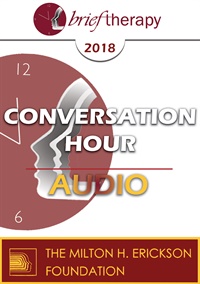
- Average Rating:
- Not yet rated
- Topic Areas:
- Great Conversations | Anxiety | Depression | Research | Training | Brief Therapy
- Categories:
- Brief Therapy Conference | Brief Therapy Conference 2018
- Faculty:
- Stephen Gilligan, PhD | Scott Miller, PhD
- Duration:
- 1:05:12
- Format:
- Audio Only
- Original Program Date:
- Dec 08, 2018
- Short Description:
- Therapists need theoretical and technical constructs, including those that are empirically based. Therapists need to understand how to create a comprehensive treatment plan.
- Price:
- $15.00 - Base Price
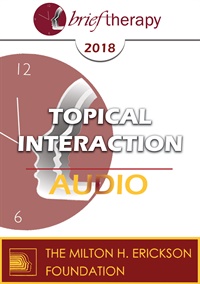
- Average Rating:
- Not yet rated
- Topic Areas:
- Topical Interactions | Anxiety | Brief Therapy | Children and Adolescent Therapy | Community | Depression
- Categories:
- Brief Therapy Conference | Brief Therapy Conference 2018
- Faculty:
- Lynn Lyons, LICSW
- Duration:
- 1:03:32
- Format:
- Audio Only
- Original Program Date:
- Dec 08, 2018
- Short Description:
- Educators are being asked to do more and more to support the emotional wellbeing of students and understand the mental health needs of their students. Programs are consistently being introduced and professional development offered. What's working and what isn't? How much can we expect of teachers and administrators? How is the collaboration and communication between parents, schools, and outside providers going? And what are students actually earning in about their mental health in school?
- Price:
- $15.00 - Base Price
Credit available - Click Here for more information
- Average Rating:
- Not yet rated
- Topic Areas:
- Workshops | Brief Therapy | Cognitive Behavior Therapy (CBT) | Therapist Development | Anxiety | Depression | Resistance
- Categories:
- Brief Therapy Conference | Brief Therapy Conference 2018 | Online Continuing Education
- Faculty:
- David Burns, MD | Jill Levitt, PhD
- Course Levels:
- Master Degree or Higher in Health-Related Field
- Duration:
- 2:00:37
- Format:
- Audio and Video
- Original Program Date:
- Dec 07, 2018
- Short Description:
- Dr. David Burns and his colleague, Dr. Jill Levitt, will do live therapy with an audience volunteer who’s been struggling with depression and anxiety. They will give you the unique opportunity to go behind closed doors to see how TEAM-CBT actually works in real time. When you witness the rapid transformation of intense self -doubt into joy, relief, and enlightenment, you will feel much better about yourself, while at the same time learning some awesome new tools that you can use right away to improve your clinical outcomes. This promises to be an exciting, educational and inspirational experience!
- Price:
-
Sale is $29.00
price reduced from Base Price - $59.00
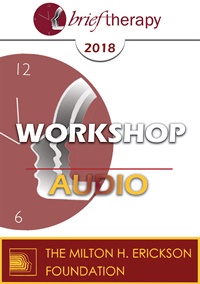
- Average Rating:
- Not yet rated
- Topic Areas:
- Workshops | Anxiety | Brief Therapy | Children and Adolescent Therapy | Depression | Family Therapy
- Categories:
- Brief Therapy Conference | Brief Therapy Conference 2018
- Faculty:
- Lynn Lyons, LICSW
- Duration:
- 2:00:14
- Format:
- Audio Only
- Original Program Date:
- Dec 07, 2018
- Short Description:
- The most frequent complaint I hear from parents about the treatment they receive for their child's anxiety? "No one told us what to DO!" Anxiety is often generational, and by the time a family arrives at your office, they have been in the grips of the cult leader called anxiety for years. Worse yet, many of the things they have been doing, although loving and supportive, are actually making the anxiety stronger. This workshop will describe how to give families immediate and active solutions from the first session, including the use of front loading to provide critical information and understanding, changing the family's relationship with anxiety, and creating active interventions that are often the opposite of what they've typically been doing.
- Price:
- $15.00 - Base Price
Credit available - Click Here for more information
- Average Rating:
- Not yet rated
- Topic Areas:
- Workshops | Depression | Continuing Education | Brief Therapy | Neuroscience | Psychopharmacology
- Categories:
- Brief Therapy Conference | Brief Therapy Conference 2018 | Online Continuing Education
- Faculty:
- Bill O'Hanlon, MS
- Course Levels:
- Master Degree or Higher in Health-Related Field
- Duration:
- 1:42:03
- Format:
- Audio and Video
- Original Program Date:
- Dec 07, 2018
- Short Description:
- Recent research and insights have given a new understanding of depression, not as a deficit in chemicals, but as a problem with neurogenesis (new brain growth and connection). Antidepressants may work by promoting brain cell and neuronal growth and connection, but there are other ways, within the grasp of therapists, counselors and addiction specialists that can make an immediate and lasting difference in helping relieve depression. This session will give three simple methods for relieving depression using insights from recent brain science.
- Price:
-
Sale is $29.00
price reduced from Base Price - $59.00
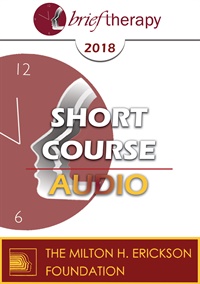
- Average Rating:
- Not yet rated
- Topic Areas:
- Short Courses | Anxiety | Communication | Depression | Neurobiology | Brief Therapy
- Categories:
- Brief Therapy Conference | Brief Therapy Conference 2018
- Faculty:
- Bart Walsh, MSW
- Duration:
- 1:29:10
- Format:
- Audio Only
- Original Program Date:
- Dec 06, 2018
- Short Description:
- Chronic anxiety and depression present significant challenges for those affected by these conditions. A behavioral treatment which accesses deep levels of mindbody functioning facilitates remission of these debilitating conditions. This treatment, conceptualized as essential neurobiological communication (ENBC), incorporates a form of body language known as ideomotor signaling. Because these are chronic conditions, the affected individual learns how to fully manage these states on their own. Also presented is a noninvasive, structured protocol for reducing the adverse influence of unresolved emotion on present experience. Essential to this model is a progressive ratification sequence intended to ground emotional adjustments in thought, perception and behavior. This brief procedure is a useful adjunct to other treatment modalities and instrumental
- Price:
- $15.00 - Base Price
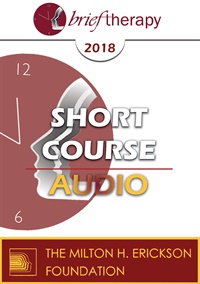
- Average Rating:
- Not yet rated
- Topic Areas:
- Short Courses | Psychotherapy | Awareness Integration Model | Brief Therapy | Anxiety | Depression
- Categories:
- Brief Therapy Conference | Brief Therapy Conference 2018
- Faculty:
- Foojan Zeine, Psy.D., MFT
- Duration:
- 1:16:41
- Format:
- Audio Only
- Original Program Date:
- Dec 06, 2018
- Short Description:
- The clinical method of the Awareness Integration model has evolved from Cognitive, emotional, Behavioral, body-oriented, and trauma releasing theories and has been researched with a diverse population with significant results toward minimizing Depression and Anxiety.
- Price:
- $15.00 - Base Price
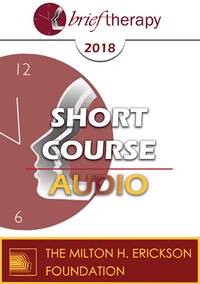
- Average Rating:
- Not yet rated
- Topic Areas:
- Short Courses | Anxiety | Depression | Self-Hypnosis | Somatic Experiences | Burnout | Psychosomatics | Self-Esteem | Stress
- Categories:
- Brief Therapy Conference | Brief Therapy Conference 2018
- Faculty:
- Paul Koeck, MD
- Duration:
- 1:33:40
- Format:
- Audio Only
- Original Program Date:
- Dec 06, 2018
- Short Description:
- This is a workshop with live Hypnotic Scaling clinical demonstration and practical exercises. Hypnotic Scaling is a simple Ericksonian & Solution Focused self-hypnotic technique to help your client self-control and resolve any Stress, Anxiety, Depression or other negative emotions.
- Price:
- $15.00 - Base Price
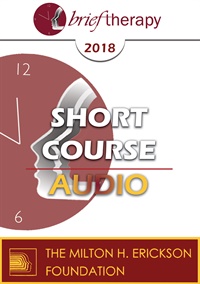
- Average Rating:
- Not yet rated
- Topic Areas:
- Short Courses | Depression | Eating Disorders | Brief Therapy | Hypnotherapy | Weight Loss
- Categories:
- Brief Therapy Conference | Brief Therapy Conference 2018
- Faculty:
- Margot Gotte-El Fartoukh, Dr. phil
- Duration:
- 1:26:23
- Format:
- Audio Only
- Original Program Date:
- Dec 06, 2018
- Short Description:
- The control of body weight is largely remote instinctively. When conscious efforts go nowhere, hypnotherapeutic strategies can open new possibilities. Presented is a model of hypnotherapeutic strategies of weight regulation introduced on the M.E.G. Congress 2018 in Bad Kissingen (Germany).
- Price:
- $15.00 - Base Price
- Average Rating:
- Not yet rated
- Topic Areas:
- Speeches with Discussants | Cognitive Behavior Therapy (CBT) | Anxiety | Depression | Psychotherapy | Therapist Development
- Categories:
- Evolution of Psychotherapy | Evolution of Psychotherapy 2017 | Evolution of Psychotherapy CBT Learning Track
- Faculty:
- David Burns, MD | Jeffrey Zeig, PhD
- Course Levels:
- Master Degree or Higher in Health-Related Field
- Duration:
- 1:19:51
- Format:
- Audio and Video
- Original Program Date:
- Dec 16, 2017
- Short Description:
- Although there's been an overwhelming proliferation of new therapies for depression and anxiety, the controlled outcome studies have yielded disappointing results. Dr. Burns argues that this is because resistance has not been addressed, and describes a new approach called TEAM-CBT that solves this problem and promises superior outcomes.
- Price:
-
Sale is $29.00
price reduced from Base Price - $59.00


